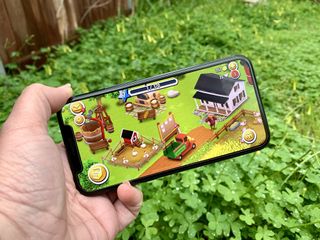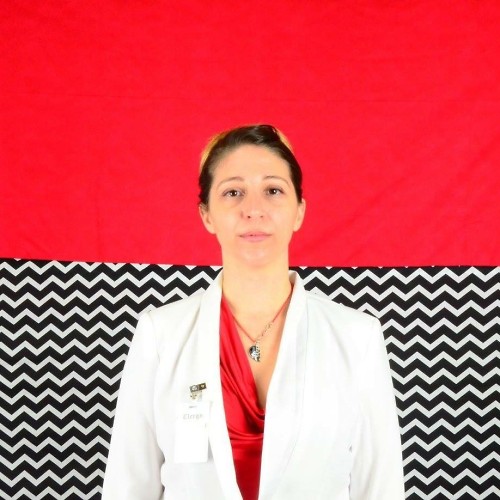
Supercell is best known for its hugely popular kingdom building game, Clash of Clans and its farming strategy game, Hay Day, but the game company has made hit after hit after hit since it was founded 10 years ago. Camilla Avellar is a game designer for Supercell and has been working on Hay Day for the past few years. Avellar has been in game design for more than 10 years and has lived in a number of different countries. One of the most interesting things about her experience is how different game design communities interact around the world.
I was able to take some time to chat with Avellar about her role as a game designer at Supercell, her world-traveling experiences, and her experience as a woman in the gaming industry.

You went from graphic design to a game artist, which does seem like a logical step for your career path. Can you talk a little bit about what got you interested in graphic design in the first place?
Well, like many teens, I was with a little overwhelmed with how do I choose what I want to be for the rest of my life? I initially wanted to go into advertising. I like drawing, I like visual arts, but I didn't want to go into a pure graphic arts area. So I decided on advertising because at the time I didn't really know about the existence of graphic design. When I discovered graphic design, I thought, "That sounds cool." So I went for it.
So right out of high school, you just went straight for the graphic design?
Yeah. I'm Brazilian, and in Brazil, we didn't have this thing about changing majors and choosing your major. You do the university test for a specific course. I did the test for graphic design.
I understand that you're a gamer, that you've been in love with games your whole life. So what I'm wondering is, when you had made that decision to go into graphic design, and then later shifted over to game design, was there ever a moment where you thought, "I'm going to be a graphic designer, but wait, here's this thing called game design. I could do this instead?"
Actually, no, because I never actually had a job as a graphic designer. I was two years into college when an internship for game art showed up. So my entire career has been games, really. I worked for a company, which did small advertising games for the Brazilian market, as a game artist for, I think, nine months. And then after that, they needed game designers and wanted to try people out internally. So I just took the opportunity and it worked.
So then you started at a company that was locally based, but you've worked at a lot of different geographic locations. You're kind of a world traveler.
After a few years at this company, I had the idea that I wanted to work and live abroad. I had worked with small advertising games and a few phone games, so I had a good portfolio of many games made and many projects completed. I joined a company called Digital Chocolate in Barcelona, which made phone games, like pre-smartphone games. And shortly after I joined, the iPhone exploded with the App Store and we started making iPhone games.
You've actually been in the gaming industry for about 15 years. Can you talk a little bit about the shift from traditional platform gaming into mobile and casual gaming? Has there been an attitude change in how big companies consider mobile games?
A lot of people who play mobile games every day don't even consider themselves gamers.
Back in the beginning of the App Store era, many people were playing games, but there still wasn't an established market. So there were some trial games that you could get for free and then buy the premium version. There wasn't really this free to play model yet. That came a bit later. But with the free to play model, it just exploded. Everyone had a very small barrier to entry. You could just download a game and play it for free for years. And yeah, I think that a shift in this mentality towards mobile games came with the fact that the audience is just huge and it's an audience that is largely untapped because it's not all gamers. A lot of people who play mobile games every day don't even consider themselves gamers or don't even consider the games they play, "games." They're just fun activities. I think, with the mentality shift in audiences, the companies also started seeing this potential for reaching new audiences.
In your experience, how do the mobile and casual gaming community rate in terms of inclusivity and openness as compared to the traditional gaming console community?
When you say communities, do you mean the professional community or the gamers, the players themselves?
The players themselves?
I feel like the more hardcore console-based community takes the term "gamer" more as an identifier and that can create a bit more of an insular feeling in that community. But recently, there has been a nice explosion of casual games on consoles that is opening and broadening up the audience and there is even acceptance from hardcore gamers to these new experiences, like Untitled Goose Game and the whole crossover of Animal Crossing and Doom because of their release dates. And it's so sweet to see. With the more casual and mobile audiences, I feel that, because they're less defined by what they play, they are less of a tight-knit community. It's not as exclusive since they are not defined by that.
Can you also talk about the professional community? Do you see similar patterns in that same way?
Finland is a very unique developer community.
I can't say much about the console-based industry side because I've never worked on that side. It's hard for me to say, in general. Finland is a very unique developer community. With Finland, as a whole, people are very open and very communicative. They really talk to everyone. We share trade secrets. Every company talks to every other company. It's great. So it's easy not to feel excluded because like if you go to a gathering, everyone is just talking to everyone. Not only mobile, but also console. I've never particularly felt excluded.
Have you seen a shift in how women are represented in games? Do you see that there is a larger presence of women in the gaming industry and in the tech industry in general?
Yeah, I believe so, at least from what I see. More people I work with and communicate with are women. Like you really see the buzz happening. It's not yet at a level that I would say, "Oh, this is great," but it is slowly improving. And I feel like it's slowly picking up speed and eventually, I think it'll come to a really good level. And because there are so many more women in the industry and diverse people making games and sharing their experiences, that translates into them represented in their products.
What it is one bit of advice that you wish you had gotten when you first started out as a game artist and then game designer in the industry?
Even people who have been 15 or 20 years in the industry doubt themselves every day.
I think the biggest for me would be; Believe that you know what you're doing and know that, a lot of people, even people who have been 15 or 20 years in the industry doubt themselves every day. If you keep going, and you keep doing, you'll keep learning. And every day will be easier than the last day. Even the pros sometimes wonder what they're doing.
What would you say to girls and young women out there wondering whether there is a chance for them in game development or in the tech industry?
I'd say that now more than ever, it's easy to make your games and share your experiences and even if it's not as a career to start with. It's easy to download a game engine. Learn how it works. Learn how to make art. A game doesn't need to be perfect and beautiful in order to be meaningful and shareable. If you can't find a community locally, there are communities online. If you want to pursue it professionally, don't be afraid of talking to people by going online to a Twitter account of a developer, sending them a message. Seeing if you can create a rapport and talk to people. I think talking to people is really important when you work with games because there is so much opportunity for learning.
Master your iPhone in minutes
iMore offers spot-on advice and guidance from our team of experts, with decades of Apple device experience to lean on. Learn more with iMore!
Lory is a renaissance woman, writing news, reviews, and how-to guides for iMore. She also fancies herself a bit of a rock star in her town and spends too much time reading comic books. If she's not typing away at her keyboard, you can probably find her at Disneyland or watching Star Wars (or both).

